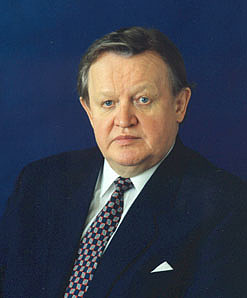Former President Of Finland To Speak At Institute For Advanced Study

Martti Ahtisaari, President of the Republic of Finland from March 1994 to February 2000, will give a lecture entitled "Can Our Democracies Rise to the Global Challenges of the 21st Century?" on April 17 at the Institute for Advanced Study. The talk, sponsored by the Institute's School of Historical Studies and the Director's Office, will take place at 4:30 p.m. in Wolfensohn Hall on the Institute campus.
According to President Ahtisaari, the majority of the foreign and security policy challenges faced by states in the 21st century are global; tackling them effectively demands multilateral co-operation. These challenges include terrorism, globalization, the spreading of weapons of mass destruction, the integration of Russia into a co-operative framework, the Balkans, and other issues.
In the current state of world affairs, Ahtisaari says, rule of law and respect for human rights are more valid than ever. "The root cause of terrorism is not religion," he says, "but lack of democracy and accountability." Ahtisaari is convinced that the ability of our democracies to rise to global challenges will depend on our ability to build more ambitious transatlantic co-operation.
Upon leaving the presidency of Finland, Ahtisaari took on the co-chairmanship of the New York-based East-West Institute and became Chairman of the Brussels-based International Crisis Group. A member of the Joint Advisors’ group for the Open Society Institute and the Soros Foundation, he also chairs the Balkan Children and Youth Foundation and the Global Action Council of the International Youth Foundation, as well as the International Board of the War-Torn Societies Project. Other post-presidential activities have included appointment by the British government to inspect IRA weapons dumps in Northern Ireland and, at the request of the European Court of Human Rights, participation in the drafting of a report on human rights and the political situation in Austria.
Ahtisaari joined his country's Ministry for Foreign Affairs in 1965. From 1973 to 1976 he was Ambassador to Tanzania. He was UN Commissioner for Namibia from 1977 to 1981, and was appointed Special Representative of the Secretary-General for Namibia in 1978.
Ahtisaari served from 1984 to 1986 as Under-Secretary of State in charge of International Development Cooperation in the Ministry for Foreign Affairs of Finland. He was Governor for Finland in the African Development Bank, the Asian Development Bank, and the Inter-American Development Bank, as well as the International Fund for Agricultural Development. In 1987, President Ahtisaari was appointed UN Under-Secretary General for Administration and Management. He retained his functions as Special Representative of the Secretary General for Namibia and led the UN operation in Namibia (1989-1990).
As of July 1991, Ahtisaari served as State Secretary in the Ministry for Foreign Affairs. During 1993 he was Chairman of the Bosnia-Herzegovina Working Group of, and Special Advisor to, the International Conference on the former Yugoslavia.
Ahtisaari graduated from the University of Oulu in Finland in 1959, and received an Honorary Doctorate (Pedagogy) from the same institution in 1989.
When Ahtisaari received the 2000 J. William Fulbright Prize for International Understanding, the citation recognized him "as peacemaker in some of the world's most troubled areas. His commitments to strengthening civil society, extending democratic practices, and furthering peaceful cooperation and coexistence have repeatedly led foreign governments to seek his aid in resolving difficult and violent conflicts."